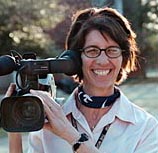When were the Good Old Days of television? Legend has it that the good old days were the times that ended "the day before you started your first job in television."
They were the days when we always bought an extra seat on the airplane for the TV camera. They were the days when we peeled off fives and tens for valets, bell captains, room service waiters, and a couple of twenties for the skycap. Back then, a producer wouldnít dream of looking through the camera or framing a shot without permission. They would sit in the back seat of the crew car, and they would buy us dinner. The hot camera was the Ikegami HL "Handy Looky" 79A, and the Umatic deck was the Sony BVU 110 (aka the "one ton"), or its lighter companion, the BVU 50. Those were the days before half-days, flat rates, and before one-man-bands - except in local news--and before still photographers shot video, and before some took the label "Platypus," an animal that could only be envied by a mammal who has never given birth, let alone laid an egg. During my Good Old Days, I had not given birth either. Our house plants were very hearty, or dead, and we could run out the door without a care. We traveled with hundreds of dollars in cash in our pockets. There was a cashier window at NBC in Burbank, where fifties and hundreds were disbursed with abandon, and I could write "filming permit" on my expense report, to cover a bribe I had paid in Tijuana.
When I was first hired as a TV news photographer at WBZ in Boston, I was given a 25-page book of Standards and Practices, and I learned them. During these Good Old Days of mine, I had a Good Old Time traveling with a Good Old Boy audio technician. In an era when crews stayed together for years, our longevity was nothing when compared with the other network teams--Olson and diCarlo, Dunn and Johnson, White and Sung, Gayton and Muhammed. Now that the Good Old Days have passed,
some of my contemporaries continue to make an excellent living doing a
great job shooting for the network magazine shows, and cable offerings
from A&E, National Geographic, or Discovery.
One friend of mine, a satellite uplinker, went back to school in engineering. He paints an evocative picture of his life in Montana: his kettle boils water on the wood stove, a kerosene lantern is lit, and he connects to the World Wide Web on the laptop he charges with a solar converter. He is "off the grid, but on the Net." After 16 years as a network audio technician, my former partner sharpened his computer skills and took a job doing graphics for a defense contractor. One network cameraman moved to Arizona,
where he makes saddles for endurance horses.
I sold my Betacam in 1996, and became a freelance field producer. Shortly after this, I worked with a staff crew from CBS in Dallas. The cameraman told me, "Sometimes I think about giving up camera work and becoming a field producer. So I lay down until the feeling passes." I donít resent the changes in television journalism since the Good Old Days. The industry changes with our culture. Though, I often think about finding some other kind of work that will allow me a more predictable life. When I worked at WCVB-TV in Boston, a very
talented young desk assistant told me that he was quitting his job. The
pay was very low, and the advancement was slow. But, I couldnít believe
he would walk away from a job in a TV newsroom--so he told me an old story.
Itís the one about the guy who cleans the elephant manure in the circus.
He goes to the boss and says, "Boss, I quit." The boss replies, "What?
And leave Show Biz?"
 Amy Bowers
|
